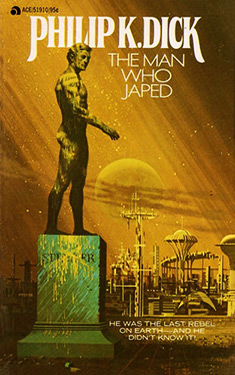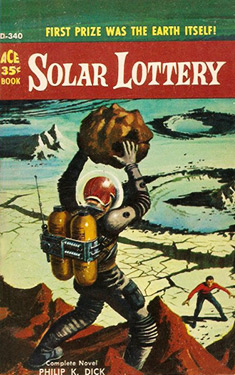Philip K. Dickathon: The Man Who Japed
Guest Blogger and WWEnd Member, Charles Dee Mitchell, has contributed a great many book reviews to WWEnd and we’ve invited him to contribute to our blog. This is the latest in Dee’s series of Philip K. Dick reviews that he started on his blog www.potatoweather.blogspot.com. We’ll be posting one every week until he runs out of reviews or gets tired of Philip K. Dick books.
 I was going to say that The Man Who Japed was for Philip K. Dick completists only, but then I read that in the mid 60’s he considered it the best thing he had written to date. And this was after Man in the High Castle had won the Hugo Award.
I was going to say that The Man Who Japed was for Philip K. Dick completists only, but then I read that in the mid 60’s he considered it the best thing he had written to date. And this was after Man in the High Castle had won the Hugo Award.
I don’t know why he was so fond of it. The Man Who Japed was originally half of an Ace Double, so it could pass as a novella. It is also just one of about five book-length works Dick wrote or put under copyright in 1956. Familiar PKD elements are all in place: a postwar dystopian future, a lone hero going against the code, incredibly fast pacing, digs at psychiatry, a brief trip to another planet. This is a moral world where the morality is enforced by neighborhood watch societies headed by middle-aged women in floral print dresses. (Such beings seem to be a particular horror to PKD. They show up in Eye in the Sky as well.) The ladies get their information from "the juveniles," two-foot-long mechanical centipedes charged with keeping a watch on things. Alan Purcell is part of this system. He works in a form of advertising that broadcasts campaigns with moral lessons that are good for the populace. During the course of the book he falls very afoul of the system and plots to overthrow it.
Satire and action here are good, but Dick’s most prescient insights have to do with real estate. In the 22nd century people with tiny apartments close to the center of town live in fear of code violations that will exile them to what I suppose are tenements or something equally unpleasant further out.
Philip K. Dickathon: Eye in the Sky
Guest Blogger and WWEnd Member, Charles Dee Mitchell, has contributed a great many book reviews to WWEnd and we’ve invited him to contribute to our blog. This is the latest in Dee’s series of Philip K. Dick reviews that he started on his blog www.potatoweather.blogspot.com. We’ll be posting one every week until he runs out of reviews or gets tired of Philip K. Dick books.
 Philip K. Dick wrote Eye in the Sky in 1957 and set it in 1959. That’s not much of a leap as things go in sf novels, but it allows Dick to keep the society he describes, that of Northern California with its combinations of defense contractors and university types, contemporary. When I read the novel, I thought the slight time alteration also allowed him to create the fanciful Bevatron, some sort of particle accelerator whose malfunction propels the plot. But it turns out UC Berkeley did have a genuine Bevatron on hand, an early precursor of the CERN projects currently attempting to capture anti-matter along the Franco-Swiss border. The one in Belmont featured in the novel is fictional.
Philip K. Dick wrote Eye in the Sky in 1957 and set it in 1959. That’s not much of a leap as things go in sf novels, but it allows Dick to keep the society he describes, that of Northern California with its combinations of defense contractors and university types, contemporary. When I read the novel, I thought the slight time alteration also allowed him to create the fanciful Bevatron, some sort of particle accelerator whose malfunction propels the plot. But it turns out UC Berkeley did have a genuine Bevatron on hand, an early precursor of the CERN projects currently attempting to capture anti-matter along the Franco-Swiss border. The one in Belmont featured in the novel is fictional.
I doubt, however, that the real Bevatron could ever have caused the situation that arises in Eye in the Sky. Dick’s novel is a kind of The Bridge of San Luis Rey in reverse. Instead of learning the past of those characters that die in the collapse of a bridge in Peru, we enter the dream world of the victims of the Bevatron’s misfire, which has left them unconscious on the floor of the contraption. Initially they are all pleased to find they have come through the event relatively unscathed, but something has changed. They live in a theocratic society and a geocentric universe where the sun is a low-burning star rotating close to the earth, the moon is a tiny lump of matter, and when two characters ascend into the heavens by holding onto the handle of large black umbrella — don’t ask for details here — they see the fires of Hell burning below the earth and float over the walls of heaven where the great unblinking eye of God glares up at them.
The main action of the novel involves the characters’ efforts to extricate themselves from one world only to find themselves in another: the saccharine, sexually neuter land dominated by the whims of a prissy, middle-aged woman; the monster-filled world imagined by a paranoid old maid; and a fantasy of America as depicted in Communist propaganda.
The Communist angle figures large here. In the opening scene, Hamilton, our main character, loses his job at the missile plant when his wife comes under investigation for her possible left-wing sympathies. Dick and his wife were briefly investigated in Berkeley about the time he wrote this novel, but that could not have been all that uncommon an event in 1950’s Berkeley. In fact, Mr. and Mrs. Dick seemed to have got on well with their investigators. One of them taught Philip to drive, and his wife cooked for them. The relationship soured when the Dick’s turned down an opportunity to relocate to Mexico as spies.
The book is dated by other attitudes and behaviors. Everyone smokes like chimney, although that is probably true of most 1950’s fiction. The central character’s liberal attitude toward the "Negro situation" can be awkward, although Laws, the black character, is given one good chance to let loose on Hamilton. The ugliest aspects of the novel are Dick’s relish in describing the ugliness of two female characters, one obese and the other the uptight old maid who fills the world with monsters. Hamilton’s wife, on the other hand, is perfect in every respect. Silky is the only other female character. She is a bar waitress/prostitute who appears in each of the worlds, and her ever-changing breasts receive DIck’s usual level of scrupulous attention.
Going from dream world to dream world threatens to become boring, but the device Dick employs to cut things short is a cop out. The "normal" characters with a firm grasp on reality will not be creating any dystopias. The one twist at the end is not worthy of the dynamic Dick has put into play. Of course, nothing can live up to that umbrella ride to heaven that takes place so early on in the book.
The denouement is another charming period detail. Hamilton and Laws leave the defense industry to start producing state-of-the-art hi-fi equipment. This will usher in a new world of racial harmony and high-end electronics.
Philip K. Dickathon: Solar Lottery
Guest Blogger and WWEnd Member, Charles Dee Mitchell, has contributed a great many book reviews to WWEnd and we’ve invited him to contribute to our blog. This is the first in Dee’s series of Philip K. Dick reviews that he started on his blog www.potatoweather.blogspot.com/. We’ll be posting one every week until he runs out of reviews or gets tired of Philip K. Dick books.
 I have decided that 2011 will be the Year of Philip K. Dick. (Early 2010 was the Year of J G. Ballard.) I have laid in a supply of novels, non-fiction writings, a biography, a French intellectual’s analysis of the work, and four, over-priced volumes of his letters. I am set to go.
I have decided that 2011 will be the Year of Philip K. Dick. (Early 2010 was the Year of J G. Ballard.) I have laid in a supply of novels, non-fiction writings, a biography, a French intellectual’s analysis of the work, and four, over-priced volumes of his letters. I am set to go.
I like to start at the beginning. Solar Lottery is the first novel, published in 1955, by which time he was already cranking out short stores for a variety of sf pulp magazines. I suspect I will fall back on the phrase "cranking out" fairly often when writing about Dick’s output, but I do not mean it derogatorily. Dick wrote fast. He also rewrote fast, and as someone who has done only journalism I am appalled at how many times a 5000 word short story, for which he is maybe getting paid pennies a word, goes back and forth between the editor and author. But he was lucky to have Anthony Boucher as an early editor. I don’t think Boucher’s influence on the shape of the early stories has been fully investigated.
Solar Lottery takes place in what will become the prototypical Dickian world — an illogical totalitarian state, where the population scrambles to maintain their "ratings" by working in the Hills, international conglomerates spaced around the earth, the capital of which is now Batavia, Indonesia. Society is controlled by the twitches of what is called "The Bottle," a lottery device for which the populace hangs on to their P-cards that promise them a one in six million chance to become quizmaster, an enviable top spot that also involves an army of telepaths to protect the winner from constant and legally sanctioned assassination attempts. Anyone with any sense wears good luck charms.
Our hero, Ted Benteley, has been laid off from his Hill. He is an 8-8 classified Biochemist and flies to Batavia in an attempt to get a job with the current quizmaster, Reese Verrick. What he doesn’t know is that he is joining the team of a man who has just been replaced, after ten years, by a twitch of the bottle that has transferred the role to Leon Cartwritght, an unclassified leader of a the Prestonites, a scraggly religious cult based on the teachings of one John Preston. Preston disappeared over a century before into the world beyond the nine planet system in search of the flaming disk.
But wait, I am falling into the thankless task of attempting to summarize a Philip K. Dick novel. The pleasures of the novel, which he wrote when he was twenty-five years old, lie in Dick’s ability to immerse you in this future world, where, as a reader, it is best to not ask questions and just enjoy the ride. Events race along, but overall they make sense and follow the logic of Dick’s 23rd century Earth. Dick seldom defines much of his invented nomenclature, but most is easy to follow. "Teeps" are the telepathic corpsmen protecting the quizmaster. When Varrick looses that role, he’s been "quacked." "Unks" are the unclassified masses. The bubble-like resort on the moon is protected from the atmosphere-free exterior by "exit sphincters." And as in all the Dick novels I have ever read, he proves to be quite the tit man. Standard female 23rd century dress tends to leave the breasts exposed, and Dick seldom fails to comment on those of each major female character.
The most obvious "first-novel" elements in Solar Lottery come towards the end, when Benteley does some of the type of soul searching that was in the Berkeley air at the time Dick wrote it. For example:
"I played the game for years," Cartwright said. "Most people go on playing the game all their lives. Then I began to realize the rules were set up so I couldn’t win. Who wants to play that kind of game? We’re betting against the house, and the house always wins."
"That’s true," Bentely agreed. After a time he said, "There’s no point in playing a rigged game. But what’s your answer?"
"You do what I did. You draw up new rules and play by them. Rules in which all the players have the same odds."
Good luck with that.
Dick will write better novels in the decades that follow, as he becomes more cynical but unfortunately also more delusional and paranoid. There is quite a cult surrounding Dick, which I am by no means a part of. I have not read enough of the work to know how I feel about it. That’s the purpose of the current project.



















 Full Details
Full Details

